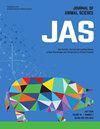The Fecal Metabolomic Signature of a Plant-Based (Vegan) Diet Compared to an Animal-Based Diet in Healthy Adult Client-Owned Dogs
IF 2.7
2区 农林科学
Q1 AGRICULTURE, DAIRY & ANIMAL SCIENCE
引用次数: 0
Abstract
Despite the rising popularity of plant-based (vegan) diets for dogs, the metabolic effects of plant-based diets in dogs have not been thoroughly investigated. Evaluating the impact of a vegan diet on the fecal metabolome in dogs could offer valuable insight into the effects on gastro-intestinal and overall health. This study evaluated the fecal metabolic signature of an experimental extruded vegan diet (PLANT) compared to a commercial extruded animal-based diet (MEAT) in healthy adult dogs. Sixty-one client-owned healthy adult dogs completed a randomized, double-blinded longitudinal study consisting of a 4-week acclimation period, where all dogs received the MEAT diet, followed by a 12-week experimental period where they either continued with the MEAT diet or switched to the PLANT diet. Fecal collections occurred at baseline (after 4-week acclimation) and exit (after the experimental period). Fecal metabolites were quantified using 1H NMR spectroscopy. Multiple mixed model gamma linear regression was used to evaluate the association of metabolite concentration against age, sex, and body weight (BW), along with an interaction between diet and time. Sixty-six metabolites were quantified. Only 2/66 metabolites differed between groups at baseline and within the MEAT diet group over time. In contrast, 46/66 metabolites differed in concentrations over time in response to feeding the PLANT diet. At the exit time-point, dogs fed the PLANT diet had increased metabolites related to carbohydrate fermentation, such as acetic (p<0.01) and propanoic (p<0.01) acid and increases in sugar metabolites when compared to the MEAT group. These findings indicate that the fecal metabolic signature of dogs fed a plant-based diet is distinct from dogs fed an animal-based diet, even if both diets have a similar nutrient profile and are processed similarly.求助全文
约1分钟内获得全文
求助全文
来源期刊

Journal of animal science
农林科学-奶制品与动物科学
CiteScore
4.80
自引率
12.10%
发文量
1589
审稿时长
3 months
期刊介绍:
The Journal of Animal Science (JAS) is the premier journal for animal science and serves as the leading source of new knowledge and perspective in this area. JAS publishes more than 500 fully reviewed research articles, invited reviews, technical notes, and letters to the editor each year.
Articles published in JAS encompass a broad range of research topics in animal production and fundamental aspects of genetics, nutrition, physiology, and preparation and utilization of animal products. Articles typically report research with beef cattle, companion animals, goats, horses, pigs, and sheep; however, studies involving other farm animals, aquatic and wildlife species, and laboratory animal species that address fundamental questions related to livestock and companion animal biology will be considered for publication.
 求助内容:
求助内容: 应助结果提醒方式:
应助结果提醒方式:


